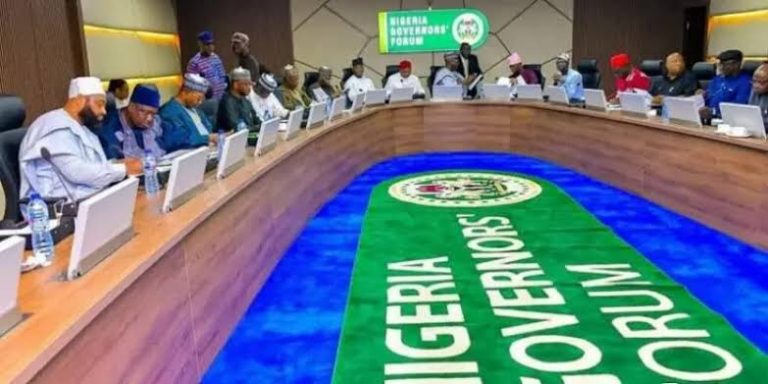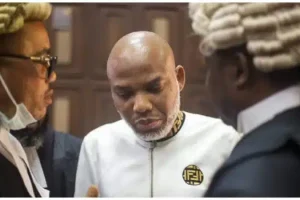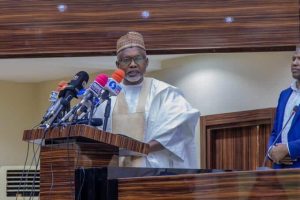
As of October, seven Nigerian states and the Federal Capital Territory (FCT) have not yet implemented the recently approved N70,000 minimum wage, despite a national expectation for compliance by this month.
Gists9ja reports that presently, 25 states have either started making these payments or publicly committed to the increase.
Among the states yet to finalize or begin the new wage are Zamfara, Sokoto, Osun, Cross River, Imo, Plateau, Taraba, and the FCT. Governors in these states, including Zamfara’s Dauda Lawal, Sokoto’s Ahmad Aliyu, Osun’s Ademola Adeleke, Cross River’s Bassey Otu, Imo’s Hope Uzodimma, Plateau’s Caleb Mutfwang, Taraba’s Agbu Kefas, and FCT Minister Nyesom Wike, have either remained silent or indicated ongoing discussions.
In Zamfara, for instance, workers only began receiving the previous N30,000 minimum wage in June 2024, even though it became effective nationwide back in April 2019. Governor Lawal’s administration has yet to issue a formal statement on adopting the new N70,000 wage, leading to concerns about potential delays.
Sokoto State faces a similar situation. Despite Governor Aliyu’s earlier pledge that his administration would prioritize wage increases, no official payment of the new minimum wage has been made. The absence of a clear timeline has created uncertainty among workers about when they might expect the increased salary.
Osun State workers are also awaiting action. Although Governor Adeleke previously promised to implement the minimum wage, no definitive steps have been taken so far.
According to Bimbo Fasasi, Chairman of the Trade Union Congress (TUC) in Osun, negotiations are underway. The union’s committee is reportedly exchanging proposals with the state government, and Fasasi expects that an agreement will be reached soon, with announcements and implementation to follow.
Cross River has also yet to adopt the N70,000 standard. Earlier this year, on May 1, Governor Otu announced a minimum wage increase to N40,000, but this was before the national directive for N70,000. Monday Ogbodum, the TUC Chairman in Cross River, confirmed that discussions are continuing with the government in hopes of securing the new rate.
In Imo State, Governor Uzodimma has given assurances of his support for the new wage, yet no binding agreement has been finalized. Charles Amaru, Vice Chairman of the TUC in Imo, mentioned that dialogue is still ongoing, with hopes for a resolution soon.
Plateau State has remained largely silent on the minimum wage issue, leaving many workers uncertain about future changes. Taraba State has also seen no progress despite Governor Kefas’s expressed readiness to comply with the national minimum wage. On September 5, 2024, he noted that discussions were happening between the Head of Service and labor representatives, but no payment has yet been implemented.
The FCT, led by Minister Nyesom Wike, has not issued any official statement on adopting the new minimum wage. Workers within the capital express growing frustration as the high cost of living in Abuja makes it difficult to sustain their livelihoods.
Across the nation, employees are voicing concerns over the adequacy of the new minimum wage, pointing to rising prices for essential goods and services. Many civil servants argue that N70,000 falls short of covering their monthly expenses.
An employee at the Federal Ministry of Industry, Trade, and Investment expressed dissatisfaction with labor leaders for agreeing to the N70,000 rate, saying it failed to account for current economic pressures.
“The cost of living keeps rising, especially in Abuja, where rent, food, and transportation are all increasingly expensive,” the employee noted, choosing to remain anonymous. “With the current inflation, N70,000 barely meets basic needs.”
Similar complaints have emerged from Osun State, where a local government worker observed that N70,000 hardly covers even two weeks’ worth of expenses due to persistent inflation and fuel price hikes. The worker highlighted that the combined effect of high prices and inadequate wage adjustments leaves many employees struggling to make ends meet.
The new minimum wage was initially accepted by labor unions, based on assurances from President Bola Tinubu that fuel prices would remain stable. However, subsequent fuel price increases in September have heightened frustrations among labor leaders and the broader workforce.
Nigeria Labour Congress (NLC) President Joe Ajaero criticized the government for what he described as a breach of trust, saying that fuel price hikes have effectively canceled out any benefit from the wage increase. “The rising cost of petrol has made the new minimum wage almost meaningless,” Ajaero stated.
He called on the government to address Nigeria’s growing economic difficulties, citing urgent issues like inflation, hunger, and poverty that continue to weigh heavily on Nigerian workers and their families.





